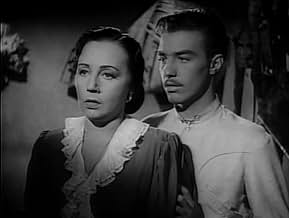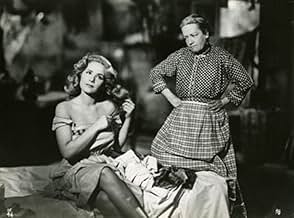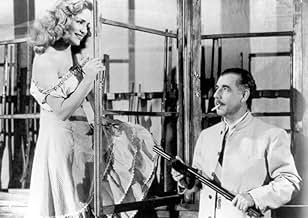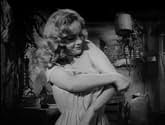An unstable young woman escapes from a reformatory for seriously wayward girls and deceptively finds shelter in the kind home of a frighteningly nice and decent family. Little by little, she... Read allAn unstable young woman escapes from a reformatory for seriously wayward girls and deceptively finds shelter in the kind home of a frighteningly nice and decent family. Little by little, she causes unrest and discord among the members of the household until they are all fighting ... Read allAn unstable young woman escapes from a reformatory for seriously wayward girls and deceptively finds shelter in the kind home of a frighteningly nice and decent family. Little by little, she causes unrest and discord among the members of the household until they are all fighting with one another.
- Awards
- 1 nomination total
- Empleado de Guadalupe
- (uncredited)
- Empleada de Guadalupe
- (uncredited)
Featured reviews
Good film about an unstable young delinquent getting away from a reformatory and finds solace at a wealthy home , being well directed by the Spanish Luis Buñuel
The movie is well worthy thanks to razor-sharp performances as well as certain critical revealing the hypocrisies of modern society , in which a wayward girl uses the power of manipulation and eroticism to get her dark purports and eventually causing distresses until they are virtually struggling with each other . The picture features exceptional work by Rosita Quintana , she's magnificently charming as well as hateful playing the insidious Susana who attempts to dissect the harmonious family group . Her acting result to be a phenomenal precedent to the character who played Sue Lyon in ¨Lolita¨ or Carrol Baker in ¨Baby Doll¨ . The baddie female is really a selfish young , a manipulating babe who hates and seduces , as well as uses her feminine wiles to tempt all around . Furthermore, a beautifully cinematography in subdued black and white by José Ortiz Ramos , being shot , as usual , in Estudios Churubusco Azteca, Mexico City, Distrito Federal, Mexico. And atmospheric and appropriate musical score by Raúl Lavista.
The motion picture was competently directed by Luis Buñuel , belonging to his Mexican period and it won Ariel Awards, Mexico 1952 and Nominee Silver Ariel Best Young Actor Luis López Somoza . After shooting Spanish and French films as "Un Chien Andalou" (1929) , and ¨Age of Gold¨(1930) , ¨Hurdes tierra sin pan¨ (1936) , Buñuel went on his Mexican period in which he teamed up with producer Óscar Dancigers and after a couple of unmemorable efforts shot back to international attention with the lacerating study of Mexican street urchins in ¨Los Olvidados¨ (1950) , winning him the Best Director award at the Cannes Film Festival . But despite this new-found acclaim, Buñuel spent much of the next decade working on a variety of ultra-low-budget films, few of which made much impact outside Spanish-speaking countries , though many of them are well worth seeking out . As he went on filming "The Great Madcap" , ¨The brute¨, "Wuthering Heights", ¨El¨ , "The Criminal Life of Archibaldo De la Cruz" , ¨Robinson Crusoe¨ , ¨Death in the garden¨ and many others . And finally his second French-Spanish period , usually in collaboration with producer Serge Silberman and writer Jean-Claude Carrière with notorious as well as polemic films , such as : ¨Viridiana¨ , Tristana¨ , ¨The Discreet Charm of the Bourgeoisie" and his last picture , "That Obscure Object of Desire" . Susana rating : 7.5/10 . Essential and indispensable seeing for Luis Buñuel aficionados.
the delicious snake in their midst.
The Fragility of an Apparently Well Established Order
She is brought into a dark and sinister cave which is teeming with rats and spiders. We know nothing about the reasons for this punishment and we can't avoid feeling sorry for her: Whatever she might have done, it does not justify an inhuman treatment such as this.
Susana is religious, and the god she calls on is kind and generous. So the miracle happens, the bars of the prison cell at which she is rattling suddenly give way and she succeeds in escaping into a night full of darkness and relentless rain.
She even can make it into paradise: A landowner's family takes her in, after she has told them a pack of lies. She is allowed to work as a maid and gains the confidence and the affection of the mother, while the father at first has a disapproving attitude towards her.
But the family's son and the steward live on the estate, too, and they don't fail to notice Susana's outstanding physical attraction. As the girl also knows how to place her charms, they both fall victim to her.
Susana, however, does not seem capable of developing any true feelings. Life is just a villainous game for her in which the rules are set by herself. The aim is to destroy the well established order. When finally even the landowner succumbs to the lure of love the initial situation becomes reversed and nothing stays the same: the mother turns into an enraged enemy, while father and son become rivals and the steward is dismissed.
It is then the latter who sets the decisive ball rolling which leads once more to a reversal of the circumstances: He finally makes use of his knowledge of Susana's escape from the reformatory, which up to now he kept to himself in order to increase his chances of winning Susana's favor, and Susana, however fiercely she may be defending herself, cannot avoid being arrested.
The game is lost, and, as it often happens in a melodrama, it is the refused lover, who makes it break down. In the end, the episode with Susana means nothing more than the memory of a nightmare for the landowner's family. And, after the re-establishment of the initial situation, the characters cannot help asking themselves if everything has really happened.
The attentive spectator will come to a different conclusion. He will notice the fundamental fragility of an order that is well established only in appearance. And he will not be able to avoid drawing a frightful parallel to his own life, in which nothing is secure and reliable either.
What happened to Susana?
Susana escapes from the reformatory in which she was locked. It's a dark and stormy night. Meanwhile in a ranch nearby the members of a peaceful family follow their occupations. An old servant maid is mumbling that in nights like this the devil walks around. Thunder and lightning. Susana's face appears in the window. She faints. She is brought inside the house. Susana is a young girl with a wayward sensuality (remember, we are in 1951). Her presence will bring discord and threaten the stability of the family.
Buñuel, even in his most surrealistic films, was always deeply anchored in the reality. That is why his films are so strong. His films have a taste of earth, humanity, sensuality. "Susana" is in fact a very sensual film. The camera subtly follows Susana, her chaotic sensuality, and the other characters' reactions to her. She's the main character but not much is told about her. She was locked in a reformatory. Why? We are not told. The world doesn't accept her and her ways. Does she know what she really wants? Unfortunately it was not possible for Buñuel to give us a deeper portrait of Susana. We see her mostly through the eyes of the outside world. Why is Susana like that? What happened to Susana?
"Susana" is an over-the-top melodrama - seemingly innocent, but in the "happy ending", that seems to come out of a fairy tale, some people may detect a hidden laughter. The film was a big success in Mexico and contributed to establish definitely Buñuel as a commercially viable director.
Rosita Quintana as Susana proves her wide acting range (a shy governess in "La Ausente" and a sensual temptress in "Susana"). She's beautiful and in "Susana", she's a real volcano. Fernando Soler also distinguishes himself as the pater familias (he was also the moralist judge in "Sensualidad" and the dissolute drinking father in "Oveja Negra").
Actors and scenery are harmoniously integrated in "Susana" and Buñuel is (as always) a master of images and very adept in creating mood. Highly recommended!
Decent
** 1/2 (out of 4)
Bunuel's remake of the 1929 American film The Squall centers on Susana (Rosita Quintana), a mentally unstable woman, who escaped from a reformatory and gets shelter from a kind and caring family. Pretty soon Susana is turning on the sexuality and starts to make the family turn against one another. The original movie is perhaps the worst Hollywood film I've seen from that era so it didn't take too much for this movie to pace it up. With that said, I think overall this is a pretty disappointing film from the director but I'm really not sure if he could have done anything different to make it better. To me, this story just doesn't work because it's just so over dramatic that you can't help but role you eyes at all the "tragedy" that befalls the people around Susana. The only thing this movie tells you that men are dumb and can be changed due to a woman's sexuality. This really isn't too dramatic and in the end the movie begins to drag. Another problem I had with the film is that the characters were all pretty annoying and that includes the old aunt who is constantly screaming religious sayings. I'm not sure if Bunuel made her so over the top for laughs or if this was just his way to go against Christians. Even with all that said this is still a beautiful film to look at with some great cinematography. The performances are also good but I was expecting better considering the director. Quintana is great and really steals the film as she plays the innocent virgin to trick the family very well and on the blink of a dime she can turn into the slut. Fernando Soler is also very good as the head man of the home.
Did you know
- How long is Susana?Powered by Alexa
Details
- Release date
- Country of origin
- Official site
- Language
- Also known as
- Susanna - Tochter des Lasters
- Filming locations
- Production companies
- See more company credits at IMDbPro
- Runtime
- 1h 26m(86 min)
- Color
- Aspect ratio
- 1.37 : 1





























